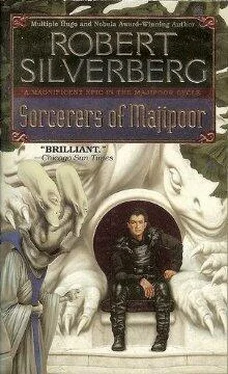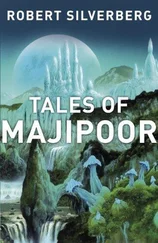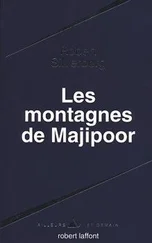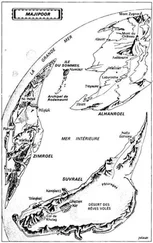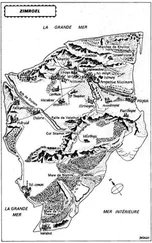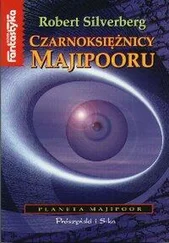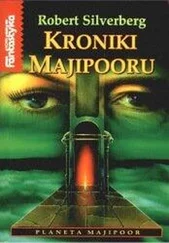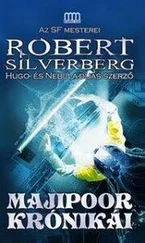There was no end to the wonders that Gominik Halvor paraded before them, although his actual demonstrations of technique were few and far between. And to Prestimion’s way of thinking, the results he attained could almost always be explained away, if one were willing to work at it, in some mundane fashion not involving incantations and charms.
Prestimion and Septach Melayn had much private sport with all this at first, often making up witchcrafts of their own when the other two were out of earshot. “Cure toothache,” said Septach Melayn, “by spitting in a gromwark’s mouth and turning three times left to right.” And Prestimion: “A slowness of digestion is dealt with by counting falling stars in the sky, and squatting down on the ground just as the eleventh star of the night streaks past.” Then Septach Melayn: “To keep one’s nose from running, kiss the nose of a steetmoy precisely at the stroke of noon.” And there were many more, until they grew tired of the game.
It was good diversion for Prestimion, these early unhappy days in Triggoin, to go night after night to the magus and listen to his recitations. But gradually, as Gominik Halvor not only expounded on the arts of divination and the summoning of spirits, but led his pupils to make modest experiments of their own in such things, Prestimion began feeling a strange sense of distress. While much of what Gominik Halvor had to say still struck him as the wildest of lunatic fantasy, he kept encountering odd little examples of the apparent efficacy of certain spells. Those were hard to explain away.
And also, looking back over all that had befallen him, it was hard for him any longer to argue away all the various dire prophecies and forecasts that Svor had made for him, and Thalnap Zelifor, and this one and that one, in the days before Korsibar’s taking of the crown. Then too there was the vision given him by his mother’s magus, Galbifond, which had plainly showed him the battle of the Mavestoi and his flight into the Valmambra. All of which he had scoffed at, and all of which, ignored, had paved the way to his present disaster.
Under Gominik Halvor he was arriving at certain misty forecasts of his own. Once again he looked into a bowl of the kind Galbifond had showed him; and though the things it showed him now were far murkier than that other vision, they hinted at his going forth from Triggoin eventually and resuming his quest for the throne, and of further great battles, and of many more deaths, and of some immense ultimate event whose nature he could not comprehend at all but which seemed almost to hint at the end of the world, a time of blankness and blackness beyond which nothing could be seen.
“What is this?” he said to Gominik Halvor, of that last apocalyptic revelation. “What am I seeing here?”
But Gominik Halvor peered into the bowl for no more than half a second, and said in a tone of the greatest indifference, “Sometimes what looks inexplicable is merely meaningless, my good Count Polivand. And not everything that a novice conjures up has meaning. I advise you to put this from your mind.”
Which Prestimion attempted to do. But it stayed with him, that swirling vortex of nothingness churning in the bowl. The fact that he was working small sorceries of his own had already begun to unsettle him; the fact that they showed him, and Gominik Halvor, things that were incomprehensible but ominous, unsettled him even more. He felt feverish and strange much of the time now. He sometimes felt that his mind might be breaking up. To Septach Melayn, who had been his only ally in skepticism, and who remained invincibly closed-minded even now, Prestimion said one rainy night when they had sat up late together and had shared some bowls of wine, “I have built all my life about the certainties of reason, Septach Melayn, and I find that my faith in those certainties is threatened now.”
“Is it, Prestimion? Are you succumbing to your own incantations, then?”
“I confess that much of what Gominik Halvor says is beginning to make sense to me. But that statement itself makes no sense to me!”
“A sad plight, to be driven into madness by contradictions of your own devising. Relax, old friend. What these wizards spout is half madness and half fraud, and there’s no need to take either half seriously. I never have, and never will, and neither should you. Since I was a boy I’ve discarded and cast off from myself everything that didn’t seem to fit my understanding of how the world really is.”
“I can no longer do that,” said Prestimion. “Or perhaps my understanding of how the world really is has begun to change, here in this city of sorcerers. I do think I’m coming to believe these folks, at least somewhat.”
“Then I pity you.”
“Spare me that,” Prestimion said. He hunched forward, so that his face was close to Septach Melayn’s, across the table. In a quiet voice he said, “Day by day I try to find the strength to leave here and resume my struggle with Korsibar. I’m along way from that now, but the desire has begun to possess me again. Korsibar must not be allowed to hold his stolen crown: of that I’m as convinced as ever. The fate of the world may depend on what I do, once I’ve gone from here; and I may well need the help of sorcerers, which once I foreswore, in gaining my purposes.”
“Well, then, use them, Prestimion! I never said that I discarded anything that might be of use.”
“But you have no faith in sorcerers, Septach Melayn. So how can you advise them for me?”
“You have the faith. What I believe is unimportant.”
“Faith? I said only that I believe a little of what they—”
“If you believe any at all, you are converted to their creed. You’ve hooked yourself as deeply as Svor or Gialaurys or any of the rest of them. You’ll be wearing a tall brass hat next, and robes with mystic symbols on them.”
“Are you mocking me?” Prestimion asked, feeling himself grow heated.
“Would I do such a thing?”
“Yes. Yes, I think you would. You’re sitting here laughing at me, Septach Melayn.”
“Do you take offense? Shall we go outside and fight?”
“With swords perhaps?”
“Any weapon you prefer, Prestimion. Swords, yes, if you’re in a suicidal mood. Or rocks, or pieces of raw meat. Or we could stand in the street and cast spells at each other until one of us falls down with a paralytic ague.” And with that he began to laugh, and after a moment Prestimion also, and then with one impulse they reached their hands across the table and clasped them, still laughing.
But behind his laughter Prestimion was still heartsore and full of confusion, and it was a long time that night before sleep found him. Somehow, he thought, he had lost his path, and was wandering in a desert far more bewildering and hostile, even, than the one he had crossed a month or two before, in coming here to Triggoin.
The High Counsellor Farquanor said, “The wizard Thalnap Zelifor is outside, and asks an audience with you, lordship. Shall I send him away?”
The High Counsellor’s face had a curdled look. He had never made any attempt to disguise his distaste for the little Vroon.
But Korsibar said, “He’s here at my request. Let him come in. And take yourself away afterward.”
That last did not make Farquanor’s expression any sweeter. He stalked without a word to the door—it was the stark and severe little Stiamot throne-room, where Korsibar spent most of his working hours nowadays—and went out, holding the door open just long enough for Thalnap Zelifor to slip inside.
“Lordship?” the Vroon said, his yellow eyes going wide as he made his starburst before the Coronal. “Lordship, are you well?” That took Korsibar aback, that his distress should be so easily seen. He had been awake all this night past, turning restlessly and unable to find a position of comfort, and more than a few other nights recently before that one.
Читать дальше
